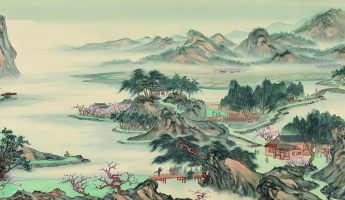Guiguzi, the representative of ancient wisdom, has inherited countless strategic ideas and management wisdom. Many modern business leaders and strategists often refer to the philosophy of Guiguzi when pursuing success and influence. How can the core concepts of Guiguzi – Dao, Fa, Shu, Qi, and Ren – help leaders succeed in complex and ever-changing environments?
1、 Dao: Leaders’ Values and Culture
‘Dao’ refers to the values and strategic direction of a leader. It is the soul of an organization and the foundation of all decisions and actions. Leaders first need to clarify their own values and form a corporate culture that matches them. In this rapidly changing era, leaders should have a long-term vision and firm beliefs.
1.1 Building a Clear Vision
To become a successful leader, one first needs to have a clear vision. Vision is not just a dream for a company, but a profound understanding and planning for the future. Leaders need to work together with their team to develop a vision that becomes a common goal pursued by all employees. For example, well-known companies such as Tesla and Elon Musk inspire tens of thousands of employees and partners worldwide through his vision of “making renewable energy the primary source of energy”.
1.2 Shaping a positive corporate culture
Corporate culture is another important component of the Tao. A positive corporate culture can enhance employees’ sense of belonging and loyalty, and strengthen team cohesion. In practical operation, leaders should shape and strengthen corporate culture through continuous communication and feedback. For example, Google’s innovation culture encourages employees to boldly try and make mistakes, sparking countless sparks of innovation.

2、 Law: Institutional and Management Framework
‘Law’ refers to management systems and operational norms. These rules and regulations are the foundation for ensuring the efficient operation of enterprises. Leaders should consider the specific situation of the enterprise and make flexible adjustments to adapt to changes when formulating management frameworks.
2.1 Develop clear rules
Clear rules can effectively reduce decision-making errors and resource waste. Leaders should establish a series of standardized processes and standards to ensure that team members have clear responsibilities and tasks. For example, many successful technology companies have established rigorous processes in project management to ensure that each project has clear phase divisions and responsible persons.
2.2 Establish an effective feedback mechanism
An effective feedback mechanism can enable leaders to timely grasp the operational status of the enterprise. Through data analysis and employee feedback, leaders can adjust management strategies in real-time and optimize resource allocation. For example, Amazon continuously optimizes its logistics and service processes to improve customer satisfaction through data tracking and real-time feedback.
3、 Technique: Specific strategies and tactics
‘Technique’ refers to specific operational skills and strategies. Excellent leaders need to take the right measures at the right time to achieve their goals.
3.1 Develop flexible strategic plans
Strategic planning is the key to a leader’s success. A flexible and clear strategic plan can help the team clarify direction and collaborate effectively. When formulating strategies, leaders need to consider various factors such as market environment, competitors, and resource availability. For example, Pepsi and Coca Cola have developed different strategies to adapt to different consumer groups in market competition.
3.2 Emphasize teamwork and execution
Relying solely on the wisdom and abilities of leaders is far from enough. Collaboration and execution within a team are equally important. Leaders should create a positive atmosphere to promote communication and collaboration among teams. In project execution, emphasis is placed on individual responsibility and team collaboration to ensure that each member can fully unleash their initiative. For example, a successful sports team is because each member can contribute their own strength to the overall goal.

4、 Tools and Resources: Utilizing Tools and Resources
‘Tool’ refers to the tools and resources used by leaders in management and decision-making. Effective use of tools will significantly improve work efficiency.
4.1 Selected Management Tools
Modern enterprises have emerged with various management tools, from project management software to automation platforms. Leaders should choose the appropriate tools based on the actual needs of the enterprise. These tools can help teams better collaborate, communicate, and manage time. For example, many companies use project management tools such as Trello and Asana in their daily management to improve team collaboration efficiency.
4.2 Effective Utilization of Resources
The effective utilization of resources is the key to improving the competitiveness of enterprises. Leaders should allocate human, financial, and material resources reasonably through data analysis and market research. For example, some companies flexibly integrate resources and form strategic synergy through outsourcing or partnership relationships.
5、 Person: The Relationship between Leaders and Teams
‘Person’ refers to managing and motivating team members. The relationship between leaders and teams determines the atmosphere and execution of the enterprise.
5.1 Incentive and Reward Punishment Mechanism
Incentive measures are an effective means of boosting team morale. Leaders can encourage employees to continuously pursue excellence in their work by establishing reward and punishment mechanisms. At the same time, timely recognition and rewards can make employees feel their value, thereby enhancing the motivation within the company.
5.2 Emphasize talent cultivation and development
Talents are the most important resource for enterprises. Leaders should pay attention to the personal development of team members and help employees realize their own value through training, promotion, and other means. For example, many well-known companies invest a lot of resources in employee training to cultivate high-quality professionals and managers.
epilogue
Guiguzi’s Taoist, magical, and human concepts have provided profound inspiration for modern leaders. In a complex and ever-changing business environment, leaders need to achieve mutual development between individuals and businesses through clear values, reasonable management systems, flexible operational strategies, and effective resource utilization. Only in this way can we stand undefeated in fierce competition and achieve higher goals.



